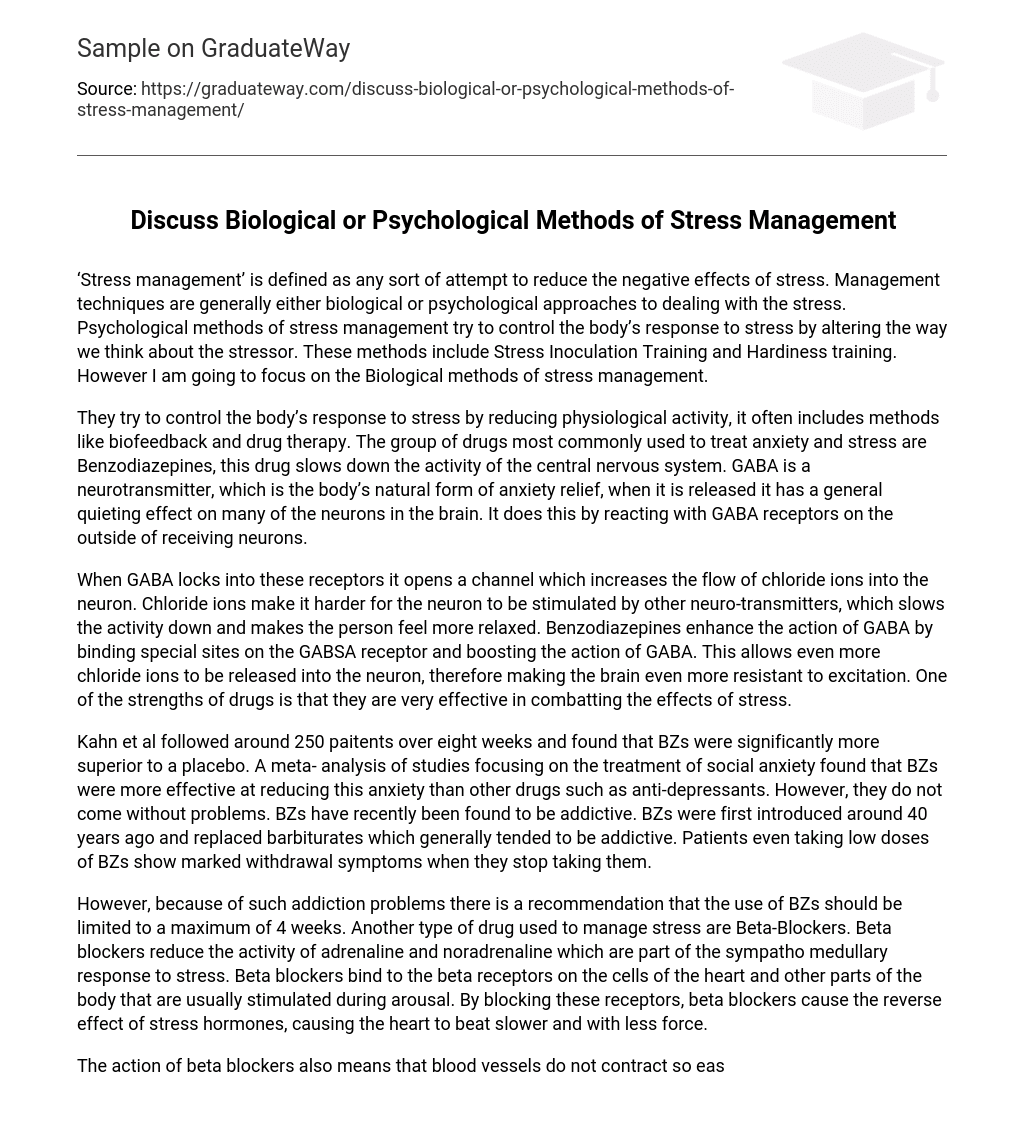Stress management entails using different techniques to lessen the negative effects of stress. These techniques can be divided into two main types: biological and psychological approaches. Psychological methods seek to affect how our body reacts to stress by changing our perception of the stressful situation. Stress Inoculation Training and Hardiness training are examples of such methods. However, this discussion will exclusively concentrate on biological strategies for managing stress.
Various techniques are employed to manage the body’s stress response and decrease physiological activity. These approaches encompass biofeedback and drug therapy, particularly benzodiazepines which are commonly prescribed for anxiety and stress. Benzodiazepines function by diminishing central nervous system functioning. GABA, a neurotransmitter that naturally alleviates anxiety in the body, plays a key role in this process. Upon release, it exerts a soothing influence on multiple neurons in the brain through its interaction with GABA receptors located on recipient neurons.
When GABA binds to receptors, it opens a channel that increases the influx of chloride ions into the neuron. This presence of chloride ions hinders the neuron’s response to other neuro-transmitters, resulting in slowed activity and increased relaxation.
Benzodiazepines enhance GABA’s effects by binding to specific sites on the GABSA receptor, thus amplifying its actions. This further facilitates the release of chloride ions into the neuron, making the brain more resilient to excitation.
Drugs possess a notable strength in effectively counteracting the impact of stress.
According to Kahn et al, a study of 250 patients over eight weeks demonstrated that BZs had a significant advantage compared to a placebo. A meta-analysis of social anxiety treatment studies indicated that BZs were more effective than anti-depressants in reducing this specific type of anxiety. However, it is crucial to acknowledge the drawbacks associated with BZs as they have been identified as addictive. Initially introduced as an alternative to habit-forming barbiturates, even individuals consuming low doses of BZs encounter noticeable withdrawal symptoms when discontinuing their use.
Although it is recommended to limit the usage of BZs to no more than four weeks due to addiction concerns, Beta-Blockers are another option for stress management. Beta-Blockers work by reducing the activity of adrenaline and noradrenaline, which play a role in the body’s response to stress. These drugs bind to beta receptors on cells in the heart and other regions that normally become stimulated during arousal. By blocking these receptors, beta blockers produce a contrasting effect compared to stress hormones, resulting in a slower and less forceful heartbeat.
Beta blockers function by inhibiting the easy contraction of blood vessels, leading to a reduction in blood pressure and diminished strain on the heart. Moreover, they efficiently suppress sympathetic arousal caused by stress, which can induce elevated blood pressure and heightened heart rate. These indications can contribute to cardiovascular disorders and compromise the immune system. By utilizing beta blockers, individuals can sustain their well-being and decrease the likelihood of acquiring cardiovascular diseases.
Beta blockers have been found to effectively reduce anxiety in various real-life stressful situations. In a study conducted by Lockwood, over 2000 musicians in major US symphony orchestras were examined, and it was found that 27% of them reported using beta blockers. The musicians in the study expressed feeling more positive about their performance after taking the medication, and music critics consistently recognized their improved performance. Another advantage of drug use is its convenience, as it requires minimal motivation or effort from the patient. The only requirement is to remember to take the pills.
Psychological methods demand considerable time, commitment, and drive. In contrast, medications are capable of efficiently alleviating symptoms; however, their efficacy is contingent upon continued usage. When an individual ceases taking these medications, their effectiveness diminishes accordingly. Although this may be satisfactory for short-lived stressors, it may prove inadequate for persistent stress. It is unwise to rely on a fast solution that could potentially engender enduring issues such as addiction. As a result, pursuing treatment that tackles the underlying cause rather than solely addressing symptoms is preferable.





